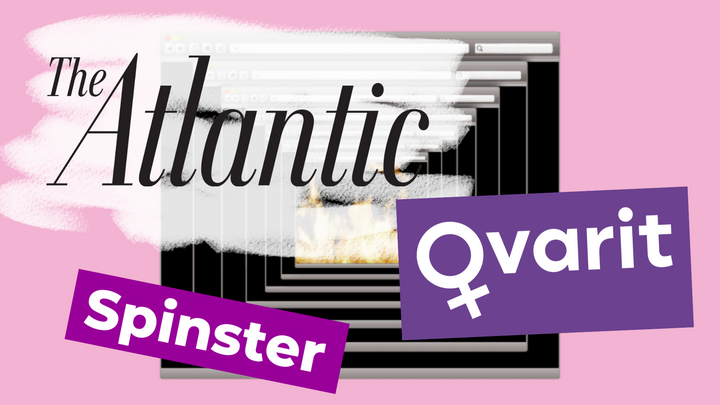Ivan Reitman Leaves a Legacy of Hypersexualized Female Characters
His male characters were often geeks and nerds interested in science and frequently openly creepy.

Ivan Reitman may not be a household name, but I can almost guarantee you’ve seen his movies. The prolific director/producer worked with A-list actors like Harrison Ford, Bill Murray, Dwayne Johnson, Arnold Schwarzenegger, Sigourney Weaver, Emma Thompson and Nathalie Portman, among others. He directed 17 feature films, including Ghostbusters (1984) and No Strings Attached (2011), as well as movies that were hugely popular with male audiences, like Stripes (1981) and Meatballs (1979). He also has 74 producer credits, including Ghostbusters: Afterlife (2021), Baywatch (2017), Hitchcock (2012), Space Jam (1996), Kindergarten Cop (1990) and National Lampoon’s Animal House (1978). He made blockbusters and has been called legendary. Popular directors like Judd Apatow and Paul Feig have commented on the significant influence Reitman had on the comedy genre.
Ghostbusters (1984), Reitman’s best-known film, is a blockbuster that made nearly US$300 million at the worldwide box office, was nominated for two Oscars, has a very dedicated fanbase and launched a franchise that includes sequels, an animated television series, comic books, board games and video games, etc. The United States Library of Congress selected it for preservation in the National Film Registry. It is considered one of the best movies of the ‘80s, as well as one of the best comedies and best science-fiction films of all time. The franchise has made billions, and it shows no signs of stopping. Last year we got Ghostbusters: Afterlife—directed by his son, Jason Reitman—and a TV series called Ghostbusters: Ecto Force has been announced. Jason Reitman is continuing his father’s work and keeping it alive.
Ivan Reitman, who died in his sleep in California on February 12th, was born in 1946 in Komárno, Czechoslovakia (now the Slovak Republic). His mother survived Auschwitz, and his father was a successful businessman in Slovakia. His family fled to Canada when he was four, and he attended McMaster University in Hamilton, Ontario. The first feature he co-produced at McMaster (The Columbus of Sex) got him arrested for its explicit sexual content and convicted under Canada’s decency laws. He was fined and given a one-year probation.
Since his death Reitman has received much public praise—most of it from men, which isn’t surprising given that his films catered to male audiences, and many showed little regard for female viewers. His male characters, who were rarely conventionally handsome, were often geeks and nerds interested in science and far too frequently openly and unapologetically creepy. It seemed he was creating entertainment for an audience of frat "boys" and was totally oblivious of female viewers: His female characters were generally reduced to beautiful love interests, his portrayals of women were limited and regressive, his films trivialized rape and normalized the consumption of pornography. Sex was a pervasive theme and sexual innuendo common.
Two of the first films he produced were Canadian director David Cronenberg’s horror flicks Shivers (1975) and Rabid (1977). The movie posters for both films clearly promise sexualized and harmed female characters. Shivers’ poster features a dead woman in a bathtub, eyes and mouth wide open, and Rabid’s shows a dead woman in a bathing suit, eyes and mouth open, crammed into a small space (possibly an elevator or a dumbwaiter elevator).
Reitman’s next projects included the hugely popular Animal House, Meatballs and Stripes—movies that glorified immature men’s irresponsible behavior and did not portray or treat their female characters too kindly. In the pornographic Animal House, in which voyeurism, pornography, rape and pedophilia are trivialized and normalized, females are hypersexualized, treated poorly, insensitively, disregarded and only play supportive roles.
As just one example, when a man (Tom Hulce) is considering raping an unconscious 13-year-old girl (Sarah Holcomb), the devilish part of his conscience tells him, “You’ll never get a better chance.” Also, men are rarely held accountable for their actions. Meatballs offers similar fare but instead of being set at an American fraternity the story takes place at a kids’ summer camp (Bill Murray’s first big movie part). In Stripes, another pornographic comedy starring Murray, women are sexualized throughout and only play supportive roles. Sexual predation is trivialized, and sexist messages are conveyed about women. For example, practically naked women mud wrestle in a strip club, John Larroquette watches women shower through a telescope and a 31-year-old Murray tells Harold Ramis the monastery isn’t an option for him because monks don’t get “wildly fucked” by teenage girls.
Reitman went on to make many films, continually reusing his favorite themes (e.g. casual sex, science) the way he repeatedly cast the same actors (Murray, Ramis, Schwarzenegger, Danny De Vito, etc.). Over the years his views on women may have evolved, but even recently he clearly still thought highly of his earliest films. For instance, in No Strings Attached (2011), starring Ashton Kutcher, a movie poster for Meatballs adorns someone’s home. Also noteworthy is the fact that Reitman directed Junior (1997), the story of a man who becomes pregnant (Schwarzenegger) and carries a baby to term (cesarean section).
Many will say Ghostbusters is Reitman’s legacy. That may well be. However, someone needs to call him out on his disservices to female viewers, beginning with the way his films trivialized and normalized the sexualization of women. He earned a place in the hearts of men, who are lamenting his passing in respectable numbers, but you can’t blame women for not being quite as vocal.
The generous support of our readers allows 4W to pay our all-female staff and over 50 writers across the globe for original articles and reporting you can’t find anywhere else. Like our work? Become a monthly donor!
Enter your email below to sign in or become a 4W member and join the conversation.
(Already did this? Try refreshing the page!)





Comments